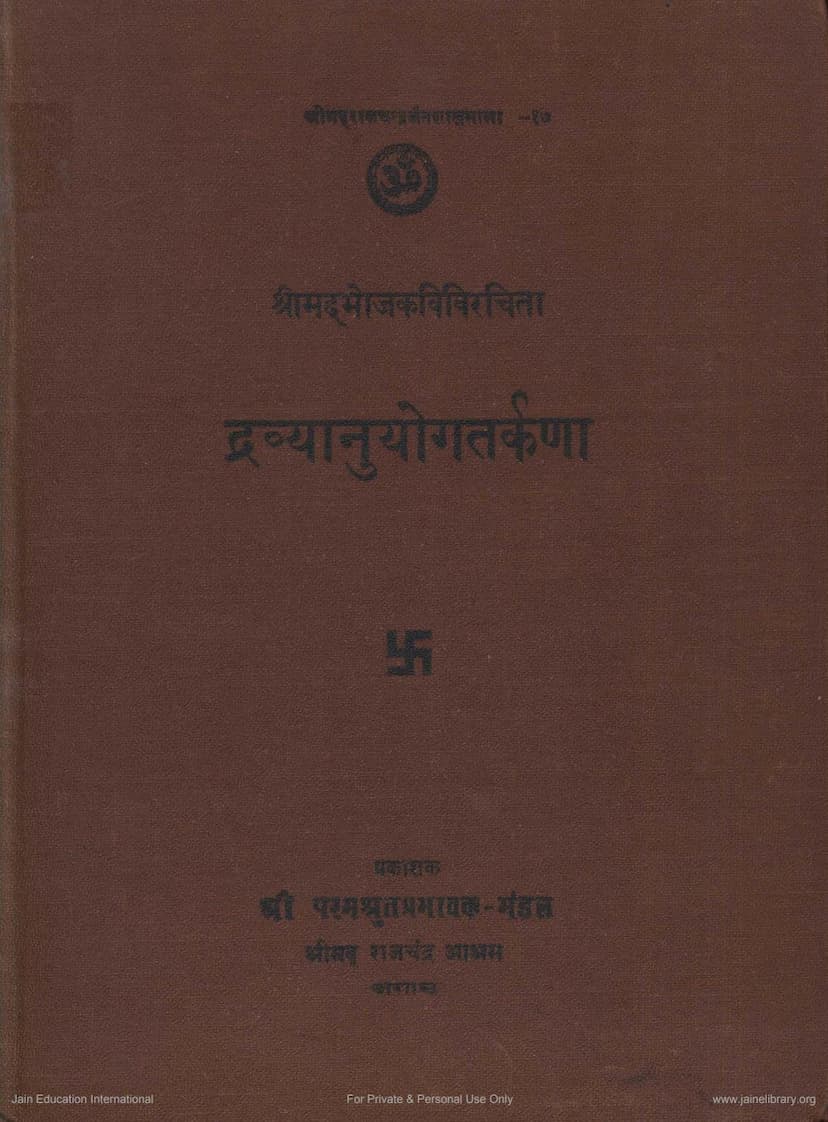Dravyanuyogatarkana
Added to library: September 1, 2025

Summary
Here's a comprehensive summary of the Jain text "Dravyanuyogatarkana" by Bhojkavi, based on the provided pages:
Title: Dravyanuyogatarkana Author: Bhojkavi Publisher: Paramshrut Prabhavak Mandal, Shrimad Rajchandra Ashram, Agas (Gujarat) Catalog Link: https://jainqq.org/explore/001655/1
Overall Purpose and Context:
The book "Dravyanuyogatarkana" is a significant Jain text that delves into the Dravyanuyoga, one of the four analytical paths (Anuyogas) in Jain philosophy. Dravyanuyoga focuses on the study of substances (Dravyas), their essential qualities (Gunas), and their modifications (Paryayas). The text aims to provide a logical and reasoned explanation (Tarkana) of these fundamental Jain ontological principles.
The publication is part of the "Shrimad Rajchandra Jain Shastramala," initiated by the compassionate visionary Shrimad Rajchandraji to awaken interest in supreme scriptural knowledge. This particular edition is a second printing, indicating its demand among seekers of knowledge.
Key Themes and Content:
The "Dravyanuyogatarkana" focuses on explaining the core concepts of Jain metaphysics, particularly as they relate to the six substances:
- Dravya (Substance): The text elaborates on the definition of a substance, emphasizing that it possesses qualities and modifications. A substance is characterized by its permanence (Dhruva), though it undergoes constant change (Utpatti - origin, Vyaya - destruction).
- Guna (Quality): Qualities are described as the inherent, permanent attributes of a substance that do not undergo change. The text likely discusses various qualities common to all substances and specific qualities of individual substances.
- Paryaya (Modification): Paryayas are the transient, changing states or modifications of a substance. The text likely explains how substances manifest these changes while retaining their essential nature.
Structure and Approach:
The book is structured into chapters that systematically explore the Dravyanuyoga principles. The provided pages highlight:
- Introduction to Jain Philosophy: The importance of Samyakdarshan (Right Faith), Samyagyan (Right Knowledge), and Samyakcharitra (Right Conduct) as the path to liberation is emphasized. Samyakdarshan, which involves knowing and believing in the true nature of the six substances, is considered paramount.
- The Six Substances: The text identifies the six substances as Jiva (soul), Pudgala (matter), Dharma (medium of motion), Adharma (medium of rest), Akasha (space), and Kala (time). It explains their fundamental characteristics.
- Nayas (Standpoints) and Syadvada (Anekantavada): The text extensively discusses various Nayas (standpoints) like Dravyanayika, Paryayanayika, Naisgam, Sangraha, Vyavahara, Rjusutra, Shabda, Samabhisruddha, and Evambhuta. It highlights how different Nayas offer diverse perspectives on reality, and how the concept of Anekantavada (multi-faceted reality) is crucial for understanding these Nayas. The discussion on Saptabhangi (the sevenfold predication) is likely a significant part of this, explaining how Syadvada allows for nuanced descriptions of reality.
- Qualities of Substances: The book details the qualities inherent in each substance, distinguishing between general qualities and specific qualities.
- Debates and Refutations: The text appears to engage with and refute the philosophical arguments of other schools of thought (like Nyayikas and Buddhists) regarding the nature of reality, causality, and the substances.
- Emphasis on Reasoning and Logic: The title itself, "Dravyanuyogatarkana," signifies a focus on logical reasoning and argumentation to establish the Jain philosophical tenets.
Contribution of Bhojkavi and the Text's Significance:
Bhojkavi, described as a disciple of Shri Vinitasagarji, presents a comprehensive treatise that aims to clarify the intricate concepts of Dravyanuyoga. The text is valuable for its detailed explanations of Nayas, their interrelationships, and their application in understanding the substances. It emphasizes the practical application of these philosophical insights for spiritual upliftment and liberation.
The role of Shrimad Rajchandra:
Shrimad Rajchandra's influence is evident through the publishing initiative, "Shrimad Rajchandra Jain Shastramala." His profound spiritual insights and his role as a spiritual guide, even to Mahatma Gandhi, are highlighted, underscoring the importance of such scriptures in spiritual development. The book itself aligns with the broader goal of disseminating authentic Jain teachings.
In essence, "Dravyanuyogatarkana" is a foundational text for understanding the ontological framework of Jainism, offering a systematic and reasoned exploration of substances, their qualities, and the diverse perspectives through which reality can be understood.